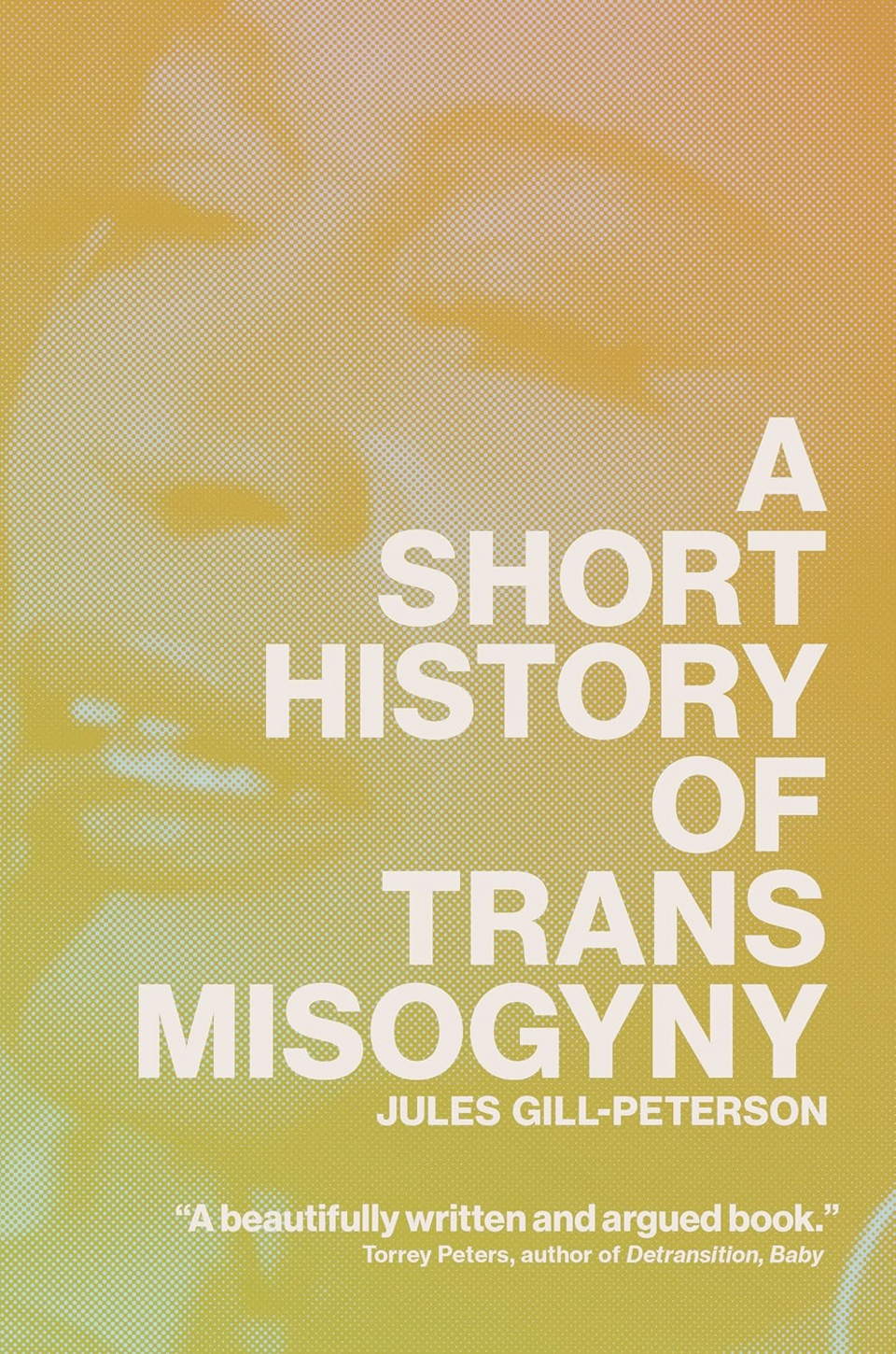What Is A (Trans) Woman?
A review examining the bold yet muddled claims in Jules Gill-Peterson's book A Short History of Trans Misogyny.
Originally written for, and then withdrawn from, Lambda Literary in Jan. 2024. Previously unpublished. See postscript at bottom.
A few months ago I counter-protested an anti-trans rally in my town. As I walked over to City Hall, I stopped to listen to a speaker on the stage. Trans people are new, he yelled. They didn’t exist before the 1970s and were a creation of the KGB and Critical Theorists like Foucault. I haven’t really read much post-structuralism and I only really know the KGB from books, so it was news for me that they tag-teamed to create me.

That argument, of course, was complete bollocks. As the line goes, trans people have always been here. At least that's the common argument. But in her most recent book A Short History of Trans Misogyny, academic and writer Jules Gill-Peterson makes the bold claim that not only was the trans panic invented in recent decades, but so was the concept of trans femininity itself. It’s a bold claim. But sadly, Gill-Peterson seems lost in the weeds of the various strands of history and her arguments are reductive or unclear.
Ahh, but the arguments. Early in the book, Gill-Peterson posits that trans women, as we understand the term now, haven’t always existed. (Don’t tell Samra Habib!). From Indian hijras in the 19th century to Sylvia Rivera and Marsha P Johnson a scant 50 years ago, trans women by and large didn’t exist. It was up to the patriarchy to uproot them “from a way of life that had no relationship to trans but for state violence, colonialism, and the political economy of industrial capitalism.” Once they did so, Gill-Peterson argues they were “trans-feminized” and all lumped into one category so they could be discriminated against. But one has to wonder: why the need to go to all this work to discriminate? I’ve certainly been hated by people who put very little thought into it.
There is something to say in her benefit over this argument: hijra, the Galli, two-spirit individuals may not all fit neatly into the 2024 definition of trans women. And yet they’re often invoked to suggest trans people have always existed. But Gill-Peterson wants to erase a chalk line from past to present in order to say that what we now understand as trans women is a completely different phenomenon. And if such a connection exists, it’s only because of outside forces echoing anti-trans rhetoric. In short, that we’re a creation of recent forces and something of a fad.

Or as she argues elsewhere: “Misogyny also promises protection to women who pledge their allegiance to misogynist causes, which partly explains why some anti-trans feminists, such as some right wing women, are content in allying with misogynist men in the dehumanization of trans women.” But Gill-Peterson’s argument is reductive: do all TERFs simply hate trans women and don’t care who they ally with? Shouldn’t there be some more nuance in this argument? Gill-Peterson uses so many words and so many commas to say so little. One might just have easily said their cruelty was the point.
Near the end of the book, Gill-Peterson lays out her boldest claim yet. “Saint Sylvia and Saint Marsha have become whoever anyone wants them to be, instead of who or what they asked others to think of them. The hagiography, or deification, of the trans women of Stonewall has ironically created more distance from the role they played as queens of the gay world.” But only a few pages earlier: “Riviera and Johnson are often celebrated today as trans women of color, as if that were a clear-cut category that was different from gay men. However, neither of them made that sort of distinction at the time.” With a little flourish, Gill-Peterson seems to want it both ways, calling them trans women at one point while also saying they were not at another. To say nothing of the sarcastic tone one reads in her awarding them sainthood.
Indeed, her arguments seem aimed more at the commodification of trans women and the way people say lines like “a trans woman threw the first brick at Stonewall” every June. But she muddles her case by attempting too much. By unpacking all the different kinds of trans womanhood, she both strips them of their agency (would “Saint Johnson” have claimed kinship with Laverne Cox? And, more importantly, does it matter if she would?) and provides fresh ammunition to the right-wing forces she claims to be pushing back against: if being trans is a new phenomenon, than perhaps it’s one that can be easily wiped away by undoing social changes from the last 50 years. This is not an outcome I imagine Gill-Peterson or any of her peers would want.
“What's common across homophobia, trans misogyny, and misogyny directed at non-trans women is the targeting and suppression of femininity as excessive,” writes Gill-Peterson in her conclusion. But in her quest to celebrate the high femme, she forgets about the rest of the spectrum. One thinks of Blaire White, the conservative trans activist who suggests there’s only one proper way to be trans; if Gill-Peterson is looking for “who will be bold enough to reclaim femininity in its most excessive, extra forms” one wonders what about the rest of us? Those who wear pants, who haven’t really worked on their voice, and maybe don’t spend an hour on our makeup? Are we, as White so succinctly put it, full of bullshit?
***
I’m running this review now because I found myself disagreeing quite a bit with a recent Gill-Peterson essay - and that I wasn’t alone in doing so. Also this book came out in paperback about a month ago, so it’s still pretty recent.
Part of the reason I withdrew this in the first place was that I felt I was being too mean and unfair to someone that I didn’t agree with, but so many of my peers did. I was afraid of stepping too far out of my lane and picking a fight I was sure to lose. Not with Gill-Peterson, who I’m sure doesn’t know who I am and will never read this, but with my peers. And when I was just starting to get higher profile gigs, I was more afraid than I am now of angering people. (In retrospect, I shouldn’t have cared at all - Lambda shuttered it’s doors before this piece could even have ran anyway).
The lesson here is a simple one: trust your gut and have enough self-confidence to stand by your opinion. As Will Leitch once wrote, if you didn’t want people to argue with you then you should have gone into banking. (Roz - 7/22/2025)